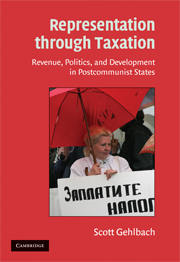Book contents
- Frontmatter
- Contents
- List of Tables
- List of Figures
- Acknowledgments
- Note on Transliteration
- 1 TAXES, REPRESENTATION, AND ECONOMIC DEVELOPMENT IN THE RUSSIAN HEARTLAND
- 2 THE CREATION OF TAX SYSTEMS
- 3 THE LOGIC OF REPRESENTATION THROUGH TAXATION
- 4 PATTERNS OF COLLECTIVE-GOODS PROVISION
- 5 REVENUE TRAPS
- 6 CONCLUSIONS
- Bibliography
- Author Index
- Subject Index
- Titles in the series
3 - THE LOGIC OF REPRESENTATION THROUGH TAXATION
Published online by Cambridge University Press: 31 August 2009
- Frontmatter
- Contents
- List of Tables
- List of Figures
- Acknowledgments
- Note on Transliteration
- 1 TAXES, REPRESENTATION, AND ECONOMIC DEVELOPMENT IN THE RUSSIAN HEARTLAND
- 2 THE CREATION OF TAX SYSTEMS
- 3 THE LOGIC OF REPRESENTATION THROUGH TAXATION
- 4 PATTERNS OF COLLECTIVE-GOODS PROVISION
- 5 REVENUE TRAPS
- 6 CONCLUSIONS
- Bibliography
- Author Index
- Subject Index
- Titles in the series
Summary
Politics, writes Harold Lasswell, is the question of “who gets what, when, how” (Lasswell, 1936). Since Mancur Olson's classic study of The Logic of Collective Action (Olson, 1965), students have been taught that the first and best answer to this question is that organized groups get what they want, at least most of the time, by coordinating contributions of time and money to influence the political process. Others may have a larger collective stake in political outcomes, but because of the free-rider problem their voices are heard more faintly and their desires attended to less assiduously.
Olson's answer to Lasswell's question raises two further concerns: how is it that some groups become organized, given the free-rider problem, and what exactly is it about the political process that gives the advantage to those that are organized? With respect to the first question, Olson argued that small groups — or more precisely, groups where the benefits of collective action are concentrated among a small number of members — more easily overcome barriers to organization, as an individual member with claim to a large share of a collective benefit cares less if others are free riding on her efforts. Political action may also be taken by large groups, but Olson suggested that this would be more a “by-product” of the provision of selective incentives.
- Type
- Chapter
- Information
- Representation through TaxationRevenue, Politics, and Development in Postcommunist States, pp. 60 - 85Publisher: Cambridge University PressPrint publication year: 2008

